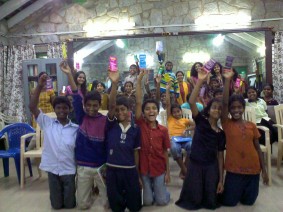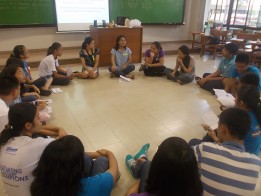MacJannet Prize 2014 Winners
First Place, receiving $7,500
Rec and Read Mentorship Program, University of Manitoba (Canada)
In 2001, with national grant research funding, Dr. Joannie Halas, a professor with the Faculty of Kinesiology and Recreation Management (FKRM) at the University of Manitoba, initiated a research project that investigated the quality and cultural relevance of physical education for Aboriginal youth in Manitoba. In 2005, the Rec and Read Mentorship program emerged from this research project as a culturally based community physical activity program for Aboriginal youth and young people living in diverse communities.
Indigenous teachings and worldviews inform Rec and Read’s holistic approach to nurturing intercultural mentoring relationships. Through the program, university and community mentors work with high school mentors to plan and deliver a weekly after-school physical activity, nutrition, and education program for early years students in both urban and Aboriginal communities. University and high school students manage the program and receive ongoing support from the Program Coordinator based at the university. Both the university and the high school students work collaboratively to develop their mentorship and leadership skills.
Expanding from one partner school in year 1, two schools in year 2, and 12 urban schools and 4 rural/northern schools in 2012, Rec and Read continues to grow. Since 2006, over 1,400 high school and elementary students and 220 university students and community mentors have participated in the program. A strength of the program is its very active engagement with the community beyond the after-school activities and strong partnerships with community groups, the City of Winnipeg and Aboriginal communities.
Second Place, receiving $5,000
Legal Services Clinic, National Law School of India University (India)
The Legal Services Clinic (LSC) began as an unofficial student initiative at the National Law School of India University with help from senior faculty members  and was officially recognized in 1997. LSC works to bridge the gap between the justice delivery system and underprivileged sections of society by organizing legal literacy camps, social action mobilization camps, conducting socio-legal surveys on issues relating to the urban poor and the unrepresented, public-interest litigation/social action litigation, and interacting with social welfare organizations.
and was officially recognized in 1997. LSC works to bridge the gap between the justice delivery system and underprivileged sections of society by organizing legal literacy camps, social action mobilization camps, conducting socio-legal surveys on issues relating to the urban poor and the unrepresented, public-interest litigation/social action litigation, and interacting with social welfare organizations.
By participating in the clinic, students practice the skills they learn about in class and they are exposed to social action work. LSC reevaluates its mission annually, with a focus on projects that provide students a platform to cultivate practical and professional skills. Current goals of the LSC include expanding pro-bono legal services and drafting rules relating to pro-bono work, improving the legal aid policy of the state, and spreading legal awareness. They are also working on an outreach project, which will create legal aid centers across the state of Karnataka. Learn More.
Third Place, receiving $2,500
Wits Initiative for Rural Health Education (WIRHE), University of the Witwatersrand (Wits) (South Africa)
The Wits Initiative for Rural Health Education (WIRHE) was founded in 2003 with the aim of recruiting disadvantaged students from rural areas into health science programs and supporting them towards becoming health professionals, to address issues of recruitment and retention of health care workers in the North West Province. The program began as a pilot program with 9 students who were supported by seed funding. In 11 years, the program has grown to include more than 50 students with funding provided by the provincial government. The North West Provincial Department of Health provides funding for 12 new students every year, while continuing to support those students already in the program. While based at Wits, the program also supports students across the province at the Medical University of Southern Africa, the University of Pretoria and part of the University of Limpopo.
science programs and supporting them towards becoming health professionals, to address issues of recruitment and retention of health care workers in the North West Province. The program began as a pilot program with 9 students who were supported by seed funding. In 11 years, the program has grown to include more than 50 students with funding provided by the provincial government. The North West Provincial Department of Health provides funding for 12 new students every year, while continuing to support those students already in the program. While based at Wits, the program also supports students across the province at the Medical University of Southern Africa, the University of Pretoria and part of the University of Limpopo.
When students are accepted into the program, they are required to a sign a commitment that upon completion of the program and their necessary medical training, they will return to their communities. They are also required to return to participate in community engagement activities in their home communities during vacations. The hope is that through this connection with the community, a culture of service is nurtured so that the contracts become unnecessary. A challenge for students coming from rural backgrounds is adapting to the academic standards of the university. However, with the support of the WIRHE program, both academic and personal, the pass rate of students in the program is around 90%, which is much higher than the average for students from similar backgrounds without this level of support. Many of the WIRHE program’s graduates are now professionals working in rural public hospitals in their districts of origin. Learn More.
Honorable Mentions
Centro de Desarrollo Comunal (CEDEOM), Universidad Senor de Sipan (Peru)
The Centro de Desarrollo Comunal (CEDECOM) was established in 2009 to contribute to the development of the Lambayeque Region of Peru through the social service triad – academic training, service learning and community empowerment. CEDECOM enables students studying law, psychology and management to get hands on experience by providing free, quality professional services to the community.
CEDECOM was developed from the idea of legal clinics and was expanded to an interdisciplinary project with 5 sites throughout Peru. Among the community needs that the program addresses are: early childhood education, gender violence, consulting needs of small family businesses and assistance regarding psychology, law and administration. In 2013, nearly 60,000 community members benefited from the professional services, 80 families have been rescued from domestic violence and 2,000 children have been provided with non-formal education. Additionally, throughout its history, the CEDECOM program has played an important role in the institutionalization of service learning at USS.
Pathways to Higher Education (PHE), Ateneo de Manila University (Philippines)
Pathways to Higher Education (PHE) was established in 2002 in the Social Development Unit of Ateneo de Manila University in the Philippines. It offers a  response to the problems of Philippine public education, which has limited access to higher education for public school students, who struggle with academic competence and lack of confidence. PHE aims to identify and nurture the next-generation leaders by providing academic and formative training to talented but underprivileged public school youth to increase their chances of admission to reputable universities while molding them into young leaders with an emphasis on developing their communities and country.
response to the problems of Philippine public education, which has limited access to higher education for public school students, who struggle with academic competence and lack of confidence. PHE aims to identify and nurture the next-generation leaders by providing academic and formative training to talented but underprivileged public school youth to increase their chances of admission to reputable universities while molding them into young leaders with an emphasis on developing their communities and country.
PHE was developed from Alay ni Ignacio (ANI), a student-led and student-founded summer school initiative. Teachers noticed participants became more confident and excited, but as the program was student run, they were unable to focus on impact assessment while they were in session. As a result, Ateneo University created PHE with full-time staff to pick up where ANI left off. ANI is now the official student arm of Pathways and continues to lead the summer program, with Pathways guiding the development of the academic and leadership curriculum to ensure maximum effectiveness. Learn More.